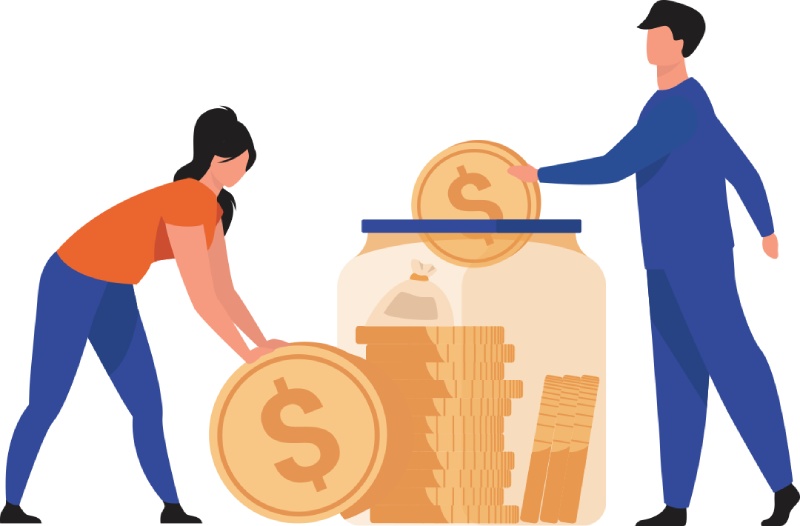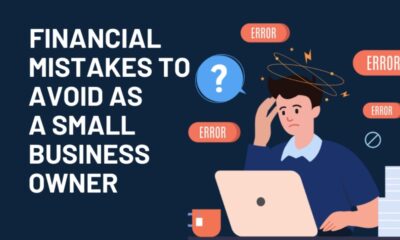Business
Try These Amazingly Easy Budgeting Tips to Increase Your Savings

One of the most important aspects of wise personal financial planning is definitely budgeting. But it’s easier said than done to make and follow a budget. A lot of people have trouble setting aside money on a monthly basis. Little impulsive purchases add up, and life can get in the way.
You have a consistent income, but all of a sudden your bank account is empty for no apparent reason. If you can relate to this, you can take charge of your finances even if you don’t know where your money is going as long as you adhere to a few crucial budgeting best practices. To increase your monthly savings, put these surprisingly successful budgeting techniques into practice. Make small adjustments to transform how you spend your hard-earned money and reap big financial rewards.
Comprehending Your Present Financial Situation
You should always evaluate your financial status before making any kind of budget. Examining your earnings as well as your outlays is part of this.
It is impossible to create an accurate budget that fits your particular situation if you don’t know exactly how money enters and leaves your home. Effective budgeting and saving start with monitoring income and examining spending.
Evaluating Your Income
When evaluating your income, don’t forget to consider your net monthly take-home pay after taxes and other deductions. If you have side jobs or commissions that cause your income to fluctuate, use an average monthly amount.
Bonuses, freelancing, and side gig earnings should be tracked separately from the main source of income for those with variable sources of income. When monthly payment amounts differ significantly, it is easier to accurately budget when income is broken down into categories.
Analyzing Your Expenses
Next, examine the expenses you are making with your take-home pay. Sort spending into fixed and variable categories.
Monthly fixed expenses include rent, auto insurance, student loans, and cell phone bills. Your lifestyle and impulsive purchases determine the variable costs you incur for things like eating out, entertainment, gas, and general shopping.
Variable costs quickly deplete budgets for many people, which reduces their ability to save. You can start controlling your excessive spending by recognizing your patterns of variable spending.
How Important Emergency Funds Are
If you haven’t already, think about creating a rainy-day emergency fund as part of your current financial assessment. Experts advise keeping three to six months’ worth of living expenses in reserve in your emergency fund account.
Instead of investing this money in the stock market or other riskier ventures, it should be kept in an easily accessible savings or money market account. Your emergency fund acts as a crucial safety net in case of unanticipated expenses such as major home repairs, medical emergencies, job loss, or other unforeseen circumstances.
Creating Reasonable Budgetary Objectives
The next step is to identify some financial goals you want to work towards, keeping in mind your current income and spending patterns. Start by thinking about your long- and short-term objectives.
Your short-term goals should be concentrated on achieving your objective within the next one to three years. Savings for a trip, a down payment on a car, or debt repayment on credit cards are a few examples. Long-term objectives also include purchasing a home, saving for retirement, and sending your kids to college.
Make sure your budgetary goals adhere to SMART criteria when you set them.
Specific: Clearly state your goals for the task at hand. Setting aside money for “retirement” is too nebulous; instead, establish a specific monthly or annual contribution goal.
Measurable: What is the plan for monitoring this goal’s advancement? Set up quantitative measures, such as monthly account balance increases of X.
Achievable: Is it possible for you to meet this goal given your current income and expenses? Don’t go overboard with your spending.
Relevant: How does this fit into your priorities regarding money? Make sure your goals represent what matters most.
Time-Bound: What age or date do you hope to accomplish this goal by? Setting a deadline encourages responsibility.
Additionally, apply positive reinforcement by emotionally connecting with and creating a vivid visualization of reaching your financial objectives. Enjoy your victories, no matter how small; optimism is essential for long-term motivation.
Applying Startlingly Beneficial Budgeting Tips
Here’s the exciting part: if properly applied, this tried-and-true budgeting methodology will help anyone save more money. There’s no need for intricate financial formulas!
The 50/30/20 Rule
This well-liked budgeting technique divides spending into three categories: needs, wants, and debt repayment or savings. It is advised to assign:
50% goes toward meeting daily expenses such as housing/mortgage, utilities, groceries, insurance, and travel.
30% go toward personal desires like shopping, entertainment, trips, and eating out.
Putting aside 20% for savings and debt repayment
Adjust the percentages to meet your specific objectives, but keeping this overall ratio in mind will help you prioritize your spending.
Zero-Based Budgeting
Planning is necessary for this budget method, which calls for allocating every dollar of net income over each month to a specific goal. Every month should end with $0 since every dollar has a “job” to do to help you reach your financial objectives.
Implement zero-based budgeting by:
Keeping track of your entire net monthly income
dividing it up among categories such as debt repayment, savings objectives, variable spending accounts, and fixed bills
Using sinking funds to plan variable spending (a $200 monthly “dining out” fund, for instance)
Ensuring each dollar goes into a category requires adjusting amounts as necessary.
The Envelope System
Using actual cash and envelopes, this antiquated budgeting method helps control variable expenses that are prone to overspending, such as dining out, entertainment, shopping, etc. It functions exactly as it seems to:
Using actual cash and envelopes, this antiquated budgeting method helps control variable expenses that are prone to overspending, such as dining out, entertainment, shopping, etc. It functions exactly as it seems to:
Put labels on envelopes for every area of spending (such as “Fun Money”).
Enter the monthly budgeted amount of money for that category (for example, $100 for fun).
As long as the money is still in its envelope, only that category should receive purchases.
The concrete spending cap considerably reduces the tendency to overspend and make impulsive purchases.
The Friend You Have in Automation
Make use of technology by arranging for automatic, recurring payments to be made from your checking account to investment accounts, debt repayment, and various savings targets. You can save passively and without much effort or discipline if you automate your finances.
Over time, even modest weekly auto-transfers of $25 add up. Use automation to make your accounts work for you automatically.
Clear Out Your Life
Give up on consumerism by clearing out unwanted items from your home to sell for extra money. Organizing garage sales or online sales to declutter can be financially and psychologically beneficial.
Reaching savings targets more quickly is made possible by cash generated from prior clutter. Additionally, minimalism has a liberating feeling and lessens the desire for impulsive purchases.
Mindful Spending
Develop more conscientious spending practices by regularly recognizing needs from wants. Consider these difficult questions for yourself before making any purchases:
- Is this something I need?
- Which issue is this resolving?
- In the following thirty days, how will I wear or use this?
- Can we wait 30 days to decide on this?
- Can I buy it used, rent it for less money, or borrow it instead?
Monitoring Your Development
Schedule monthly budget reviews and goal progress evaluations by setting calendar reminders. Create a printable accountability tracker to serve as a visible reminder.
Budgets will inevitably need to be adjusted because life is constantly changing. The idea is to continuously carry out an active budgeting process over several decades, not just a few short months.
Don’t forget to regularly celebrate financial victories. When you hit a milestone, reward yourself with a fancy coffee or buy that pointless item you’ve been putting off. Effective saving begins with self-awareness regarding expenditure.
Key Takeaways
- Analyze spending patterns and present sources of income first.
- Establish both short- and long-term financial objectives using the SMART approach.
- Automate savings by transferring funds between accounts.
- Establish systems (envelopes, sinking funds) that restrict variable spending.
- Often celebrate little financial achievements.
Conclusion
The journey of personal finance is a marathon, not a sprint; it is very personal. There isn’t a single “right way” to budget that works for everyone, regardless of family structure or stage of life. Start viewing saving money as a thrilling task with little victories that call for recognition.
The best strategy begins with self-awareness, sets reasonable financial objectives, and puts in place automated procedures that make it easier to follow a spending plan over the long haul. Prioritize small steps forward using tried-and-true budgetary frameworks.
It takes more than perfection to succeed with a budget. Over time, it necessitates continuously making more deliberate spending choices. Daily focused effort toward improved money management can result in tiny victories that add up to an unexpectedly large savings account.
-

 Sports4 weeks ago
Sports4 weeks agoAl Ahly vs Inter Miami, 2025 FIFA Club World Cup – Preview, Prediction, Predicted Lineups and How to Watch
-
Health3 weeks ago
Back to Roots: Ayurveda Offers Natural Cure for Common Hair Woes
-

 Tech3 weeks ago
Tech3 weeks agoFrom Soil to Silicon: The Rise of Agriculture AI and Drone Innovations in 2025
-

 Startup4 weeks ago
Startup4 weeks agoHow Instagram Is Driving Global Social Media Marketing Trends
-

 Sports3 weeks ago
Sports3 weeks agoFIBA 3×3 World Cup 2025: Full Schedule, Preview, and How to Watch
-

 Science4 days ago
Science4 days agoJuly Full Moon 2025: Everything You Should Need to Know, When and Where to See Buck Moon
-

 Gadget3 weeks ago
Gadget3 weeks agoThings to Know about Samsung Galaxy S26: What’s New and What’s Next
-

 Sports4 weeks ago
Sports4 weeks agoWorld Judo Championships 2025: Full Schedule, Date, Time, Key Athletes and How to Watch

























